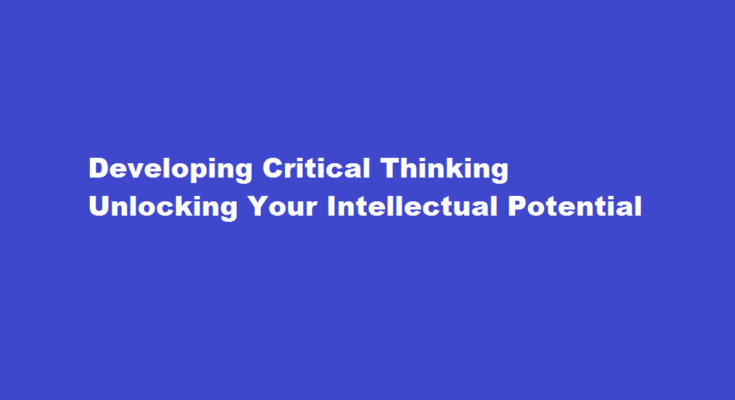Introduction
Critical thinking is a valuable skill that enables individuals to analyze, evaluate, and make reasoned decisions in various aspects of life. It goes beyond simply accepting information at face value and encourages a deeper exploration of ideas, assumptions, and evidence. Developing critical thinking skills is essential in today’s complex and rapidly changing world, where the ability to think critically allows individuals to navigate challenges, solve problems, and make informed choices. In this article, we will explore effective strategies to enhance critical thinking, empowering you to unleash your intellectual potential.
Understanding Critical Thinking
Before embarking on the journey of developing critical thinking, it is important to grasp its core principles. Critical thinking involves questioning, analyzing, and evaluating information in a systematic and objective manner. It encompasses skills such as logical reasoning, problem-solving, information synthesis, and effective communication. By fostering critical thinking, you can overcome biases, clarify misconceptions, and approach issues with a balanced and discerning mindset.
Cultivating Intellectual Curiosity
Intellectual curiosity is the foundation of critical thinking. Encourage a mindset of exploration and ask questions about the world around you. Seek out diverse perspectives and challenge your own assumptions. Embrace intellectual humility, recognizing that there is always room to learn and grow. Engage in activities that stimulate curiosity, such as reading books, engaging in debates, attending lectures, and exploring new fields of knowledge. The more you expose yourself to different ideas and experiences, the more your critical thinking skills will develop.
Analyzing and Evaluating Information
In an era of information overload, the ability to analyze and evaluate information is paramount. When encountering new information, approach it with a healthy dose of skepticism. Scrutinize the sources, consider the evidence, and question the validity and reliability of the information presented. Develop your ability to distinguish between fact and opinion, recognizing logical fallacies and biases that may influence your thinking. Seek out credible sources and engage in research to gain a comprehensive understanding of complex issues.
Developing Logical Reasoning
Logical reasoning is an integral component of critical thinking. Enhance your logical thinking skills by practicing deductive and inductive reasoning. Deductive reasoning involves drawing specific conclusions from general principles, while inductive reasoning involves making generalizations based on specific observations. Engage in puzzles, brainteasers, and logical reasoning exercises to sharpen your thinking abilities. Additionally, learn to recognize and construct valid arguments, identifying premises, evidence, and conclusions.
Effective Problem-Solving
Critical thinking and problem-solving go hand in hand. To develop your problem-solving skills, adopt a systematic approach that involves defining the problem, generating potential solutions, evaluating alternatives, and selecting the most appropriate course of action. Utilize analytical tools, brainstorming techniques, and decision-making frameworks to enhance your problem-solving abilities. Embrace creativity, think outside the box, and consider multiple perspectives when tackling challenges.
Frequently Asked Questions
Which type of question develops critical thinking?
Lastly, analytical questions should mark the perfect ending to critical thinking. Or, at least, directing the students to think critically and ask further questions that have not been asked by anyone else.
What are the six questions for critical thinking?
You can use the learning cycle and the six questions (5W + 1H system) to trigger your critical thinking. Think about the six questions: What, Who, When, Where, Why, and How, as demonstrated in the table below.
Conclusion
Developing critical thinking skills is a lifelong journey that requires dedication and continuous practice. By cultivating intellectual curiosity, analyzing information critically, developing logical reasoning, and mastering effective problem-solving, you can unlock your intellectual potential. Embrace the power of critical thinking, and you will navigate the complexities of the world with clarity, confidence, and informed decision-making.
Read Also : Mastering The Art of Effective Communication A Comprehensive Guide



